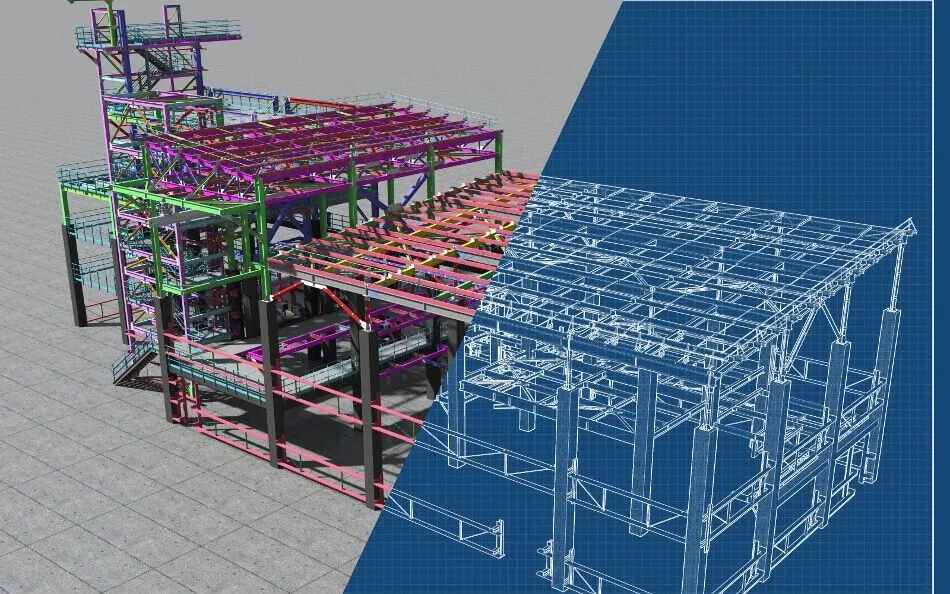BIM Manager: Job Roles, Responsibilities, Salary, & Online Courses 2025

Table of Contents
Building Information Modelling or BIM is one of the innovative approaches in the dynamic and evolving world of the Architecture, Engineering, and Construction (AEC) industry. It has transformed traditional construction processes into streamlined and collaborative journeys. BIM revolutionises the AEC industry by making projects more efficient, cost-effective, and sustainable. As technology advances, the adoption of BIM is expected to become even more widespread, further enhancing the demand for BIM professionals such as BIM managers, BIM consultants, and more.
Read this blog to understand the roles and responsibilities of a BIM manager and how to become one.
Role of a BIM Manager
One of the major roles in a construction project is of the BIM manager as he oversees that the BIM processes are implemented per the standards. He leads and supports the use of virtual tech to create BIMs in the AEC sector. With a wide range of responsibilities, BIM managers are one of the most sought-after BIM professionals in the AEC industry. However, a BIM manager’s role is different from other agents in the construction industry. A BIM manager oversees all the stages in a construction project, from planning and design to construction and completion. They make data-driven decisions while collaborating with project planners, engineers, quality designers and more.
Skills You Need to Become a BIM Manager
The role of a BIM Manager is multifaceted, requiring a blend of technical proficiency, management capabilities, and interpersonal skills. Below, we explore the critical skills needed to navigate this challenging yet rewarding career path, explaining the potential rewards, including a competitive BIM manager salary and the opportunity to shape the future of construction:
1. Technical Expertise in BIM Software
A deep understanding of BIM software is non-negotiable in the AEC industry. Proficiency in tools like Revit, Navisworks, and AutoCAD is significant, but true expertise extends to leveraging these tools to their fullest potential, optimising project workflows and quality.
2. Understanding of Construction Processes and Regulation
BIM projects require meticulous planning, execution, and monitoring. A BIM Manager must possess strong project management skills, including time management, resource allocation, and keeping projects on track and within budget. These skills are crucial in ensuring that the BIM manager's salary reflects not just the expertise in software but also the ability to lead complex projects to successful completion.
3. Collaboration and Communication Skills
The role involves coordinating with architects, engineers, contractors, and stakeholders across the project lifecycle. Effective communication and collaboration skills ensure all parties are aligned and the project progresses smoothly. BIM manager interview questions often highlight this aspect, aiming to assess how candidates facilitate teamwork and resolve conflicts.
Read more: 6 Best BIM Courses With Placements
4. Data Analysis and Interpretation
A BIM Manager must be adept at analysing and interpreting data to make informed decisions. This includes everything from cost estimations to energy analysis, helping drive project efficiency and sustainability.
5. Leadership and Strategic Thinking
Beyond managing projects and teams, BIM Managers strategically shape their organisations' approach to BIM implementation and integration. Leadership skills and strategic thinking enable BIM Managers to drive innovation, influence organisational change, and contribute to the construction industry's broader goals of efficiency and sustainability.
Responsibilities of BIM Manager
BIM manager is one of the integral profiles in the agriculture field, who bridges the gap between the human, technology, and processes. Here are the top roles and responsibilities of a BIM Manager:
1. Management of BIM Projects
Overseeing BIM projects from inception to completion is a core responsibility. BIM Managers coordinate all BIM-related activities, ensuring projects are delivered on time, within budget, and to the required quality standards. They work closely with project managers, architects, engineers, and contractors, facilitating collaboration and communication across the team.
2. Development and Enhancement of BIM Standards
To maintain consistency and quality across projects, BIM Managers develop and enforce BIM standards, protocols, and templates. These standards ensure that all project stakeholders uniformly use BIM tools and processes, enhancing efficiency and reducing the likelihood of errors.
3. Coordination and Collaboration Enhancement
By leveraging BIM technology, BIM Managers enhance coordination and collaboration among all project stakeholders. They facilitate the use of shared BIM models and data environments, enabling real-time information sharing and decision-making. This collaborative approach helps to identify and resolve conflicts early, improving project outcomes.
4. Training and Support
A key aspect of the BIM Manager's role is to provide training and support to staff. This includes developing training materials, conducting workshops, and offering one-on-one support to ensure all team members are proficient in using BIM software and following the established workflows and standards.
5. Strategic Implementation of BIM Technologies
A BIM Manager is crucial in strategically implementing BIM within an organisation. Their responsibilities are to develop and oversee the BIM strategy, ensuring it aligns with the company's objectives and project requirements. This involves setting standards for model creation, data management, and workflows, as well as selecting the appropriate BIM software tools and ensuring their successful integration into the company's processes.
Job Roles & Salaries of BIM Manager

Architects, mechanical engineers, civil engineers, designers, etc. can opt for BIM courses. It has become a standard in the future for professionals looking for desk and field jobs with a lot of exposure in the AEC industry. Here are the top job opportunities with the salary BIM architects can apply for:
1. BIM Architecture
Average salary: 5.6 Lakhs per annum
BIM Architecture focuses on the integration of BIM into the architectural design process. Professionals in this role utilise BIM software to create detailed digital representations of buildings, which include precise geometries and relevant data regarding the physical and functional characteristics of the structures. This role demands a deep understanding of architectural principles, as well as the ability to visualise and design complex structures within a collaborative BIM environment. BIM Architects are pivotal in driving the early stages of the project, ensuring designs are sustainable, efficient, and aligned with client expectations.
2. BIM Engineer
Average salary: 4.5 Lakhs per annum
It is one of the best career opportunities to look out for after completing a BIM course. BIM Engineer encompasses professionals working within various engineering disciplines, including structural and Mechanical, Electrical, and Plumbing (MEP) who apply BIM processes to their specific areas of expertise. BIM Engineers use BIM tools to simulate, analyse, and document engineering solutions. Their work ensures that the technical aspects of a project are accurately represented in the BIM model, aligning with architectural designs and construction plans. They play a crucial role in problem-solving and optimising building systems, contributing to the overall performance and efficiency of a project.
3. BIM Modeller
Average salary: 4.4 Lakhs per annum
The BIM Modeller is responsible for the creation and manipulation of the BIM models. This role requires a detailed understanding of BIM software and the ability to accurately model architectural and engineering designs, including structures, interiors, exteriors, and MEP systems. BIM Modellers work closely with architects and engineers to ensure that the models reflect the intended design intent and are free from clashes or inconsistencies. Their meticulous attention to detail and proficiency in BIM tools are critical in developing comprehensive models that serve as a foundational element for the entire project lifecycle.
4. BIM Manager
Average salary: 12 Lakhs per annum
The BIM Manager looks after the BIM process across the project lifecycle, ensuring that the BIM strategy is implemented effectively. This role involves setting standards for model creation and management, coordinating between different teams, and ensuring that project deliverables are met on time. BIM Managers must possess strong leadership skills, a thorough understanding of BIM technologies, and the ability to navigate complex project requirements. They are responsible for training and development, and technology integration, and often serve as the bridge between the technical team, management, and external stakeholders.
Read more: Salaries and Career Growth of BIM Professionals Across the World
5. BIM Coordinator
Average salary: 10 Lakhs per annum
The BIM Coordinator plays a crucial role in managing the technical aspects of the BIM process. This includes coordinating model contributions from different disciplines, managing clash detection sessions, and ensuring that models are updated and maintained throughout the project. BIM Coordinators work closely with BIM Managers to implement BIM standards and workflows and are often involved in troubleshooting and providing technical support to project teams. Their detailed knowledge of BIM processes and collaborative skills are essential in ensuring smooth and efficient project execution.
What are the benefits of having a BIM manager for a project?
A BIM manager not only brings significant benefits but also efficiency and collaboration to the project.
-
Better Collaboration: They improve collaboration between the team members by facilitating smooth communication and data sharing among all related shareholders.
-
Cost Saving: Optimised and controlled design decision with the help of ariou features in the BIM model leads to reduced waste, eventually leading to minimised cost by eliminating rework during the project.
-
Quality Control: A BIM manager ensures quality control throughout the project while identifying potential clashes.
-
Improved time management and risk mitigation: Identifying potential issues and safety concerns also adds to better time management and ensuring the project finishes on time without any compromise on cost or time.
Top 5 Online BIM Courses to Upskill in 2025
1. BIM Professional Course for Architects V2.0 by Novatr
Duration: Seven months
Placement Assistance: Yes
The BIM Professional Course for Architects V2.0 by Novatr is designed to thoroughly equip participants with a blend of foundational BIM skills, collaborative abilities, future-proof strategies, and soft skills necessary for the AEC industry. The course is nine months long and is broken down into six core studios. It focuses on foundational skills, core skills, collaborative practices, a capstone project, and a specialisation studio.
Key components of the course include detailed learning on software like Autodesk Revit and the use of Dynamo for visual programming, among others. The curriculum emphasises not only the technical aspects of BIM but also soft skills and professional development, aiming to create well-rounded professionals ready for the challenges of modern architectural design and project management. The best part is you can choose your elective, and get placement assistance including mock interviews.
2. Certificate in BIM by RICS Online Academy
Duration: Nine months
Placement Assistance: Yes
The RICS Online Academy is one of the renowned academies to offer a comprehensive course on BIM. This course includes principles, processes, and practices of BIM within the construction and real estate sectors. This course probably covers a range of key topics essential for professionals aiming to specialise in BIM, including the fundamentals of BIM, strategies for effective implementation, management practices across the project lifecycle, and the use of BIM software tools. Additionally, it might focus on the standards and protocols necessary for BIM projects, collaboration techniques among stakeholders, and the latest industry trends and technological advancements.
3. Architectural BIM by BMELabs
Duration: 240 hours - 850 hours
Placement Assistance: Yes
BIMLabs offers BIM courses tailored to the needs of professionals in the AEC sectors, focusing on the principles, implementation, and management of BIM. This course covers the fundamentals of BIM, an introduction to BIM concepts, its history, and the value it brings to the construction industry. It provides training in industry-standard software like Autodesk Revit, Navisworks, and others, covering modelling, documentation, and visualisation. The course also offers guidance on integrating BIM into business processes, including change management and digital transformation strategies. For more info, you can check out their official website.
Read more: The BIM Revolution is Here: Will You Lead or Lag Behind?
4. BIM-Ready+ by TecnoStruct Academy (H3)
Duration: Eight months
Placement Assistance: Not specified
The BIM-Ready+ course by TecnoStruct Academy is a comprehensive program designed to immerse professionals in BIM from foundational to advanced levels. It focuses on equipping participants with the skills necessary for effective BIM implementation and management across various construction projects. The curriculum is structured to cover key aspects of BIM processes, including collaboration techniques, digital modelling, project management, and the application of BIM software tools. This course aims to prepare individuals for leadership roles in BIM projects, enhancing their ability to drive innovation and efficiency in the construction industry.
5. Master’s in Global BIM Management by Zigurat
Duration: One Academic Year
Placement Assistance: Not specified
The Master’s in Global BIM Management by Zigurat is an advanced program designed to provide professionals with in-depth knowledge and skills in BIM within the global context. This comprehensive course focuses on the strategic implementation and management of BIM technologies across various sectors of the construction industry, aiming to enhance project efficiency, sustainability, and collaboration among stakeholders. Participants will gain expertise in BIM software tools, project management, digital transformation strategies, and leadership in BIM environments, preparing them for senior roles in the AEC industry.
Conclusion
To sum it up, the benefits of learning BIM extend beyond individual achievement, contributing to the broader goals of efficiency, sustainability, and innovation in the construction industry. The role of BIM Manager is a dynamic and challenging field, which requires a blend of technical, visionary leadership, and managerial skills. As the AEC industry is evolving digitally, the demand for BIM Managers is expected to rise based on the crucial role they plan in this field. If you want to learn more about BIM, you can apply for a BIM Architecture Course at Novatr.
To stay updated with the industry trends, check out our resource page!


 Thanks for connecting!
Thanks for connecting!

.png)





